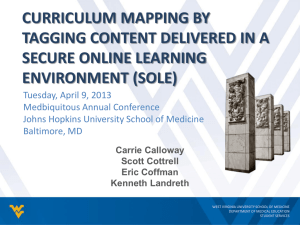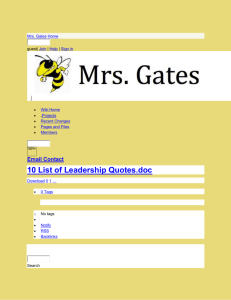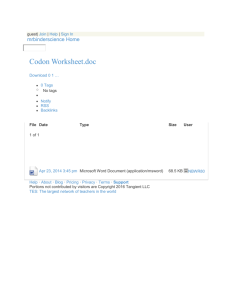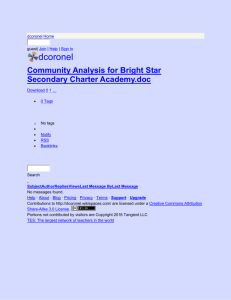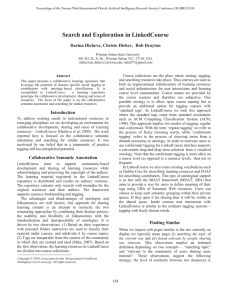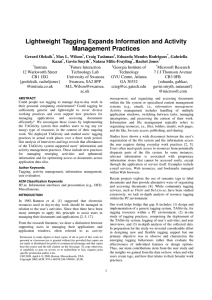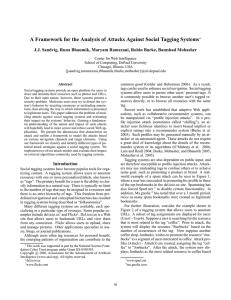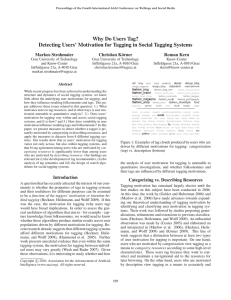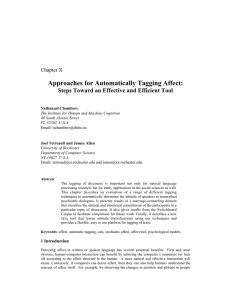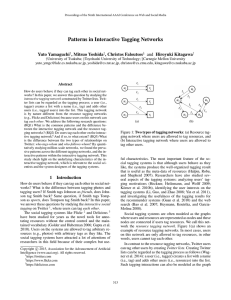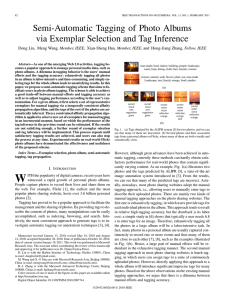Dong Liu EE Department, Columbia University Dec 20, 2011
advertisement
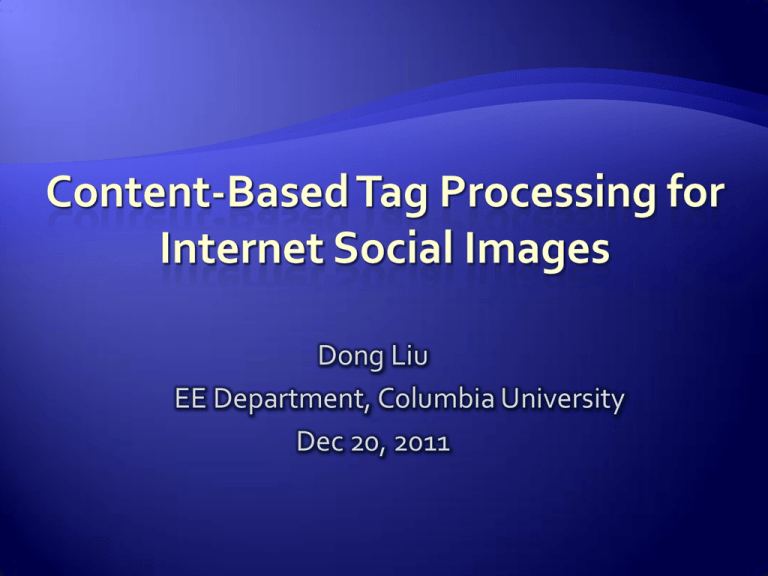
Dong Liu EE Department, Columbia University Dec 20, 2011 “Tag” has become one of the most popular Internet concepts in the last three years. Tag Social Network Micro-blogging 2 Social tags are good, but they are Lack of relevance information Noisy and incomplete Annotated only at the image level Tags need to be processed Still far from satisfactory as reliable indexingusing keywords for before them. image search 3 Liu, Hua, Yang, Zhang, Tag Ranking, WWW09 Basic Idea: Large tag clusters should be promoted. Semantically close tags should be ranked closely. 4 5 Liu, X. Hua, H. Zhang, Image Retagging, MM10. Basic idea Assign visually similar images with similar tags. Exclude the content-unrelated tags. Expand the tags with synonyms and hypernyms. 6 In term of average precision,recall and F1-Measure 50,000 Flickr images 106,565 unique tags 5000 test images (each tag was judged by human labelers to decide whether it is related to image content.) After Tag enrichment, the tag quality is further improved. 7 Similar ? For concept flower: similar For concept dog: dissimilar Whether two images are similar actually depends on what semantic tags we are caring about. Our Strategy: Learn tag-specific visual representation. 8 Airplane Noise-Tolerant Learning Algorithm Noisy ….. frequency Visual Vocabulary for airplane …..9 flower fox bear car people bird Technical Contributions Descriptive visual vocabulary construction. Learning with noises. 10 Liu, Yan, Hua, Zhang, Collaborative Image Retagging, IEEE TMM Technical Contributions Scalable multi-graph multi-label learning: Multiplicative nonnegative update rule derived from KKT condition of Lagrange function Inter-graph and Intra-graph label propagation. 11 Liu, Yan, Rui, Zhang, Unified Tag Analysis With Multi-Edge Graph, MM10. Basic Idea: Images with common tags often share similar semantic regions. Uncover the region-to-region correspondences for image pairs. 12 A new research topic in multimedia research community. Learning with hybrid, unreliable sources. Robust, efficient, and scalable solutions . Data-driven vs. Model-driven. Interplay of data, user and feature. 14 Cross-modality tag analysis Learn an intermediate representation that maximizes the correlation between the visual content and semantic tags. Visual understanding using tag cues Infer fruitful contextual information about the visual content from the tags . Scalable automatic tagging Develop scalable statistical learning algorithms to handle large scale training data with huge number of tags. 15 dog horse airplane ………… airplane, sky,….. dog, grass, tree,.... Batch tagging Pros: The manual efforts can be significantly reduced. Cons: Introduce a lot of imprecise tags to many images. Exhaustive tagging Pros: Tagging accuracy is relatively high. Cons: Too labor-intensive and time-consuming. There is a dilemma between manual efforts and tagging accuracy. 17 Liu, Wang, Hua, Zhang, Semi-Automatic Tagging of Photo Albums via Exemplar Selection and Tag Inference , IEEE TMM10. • Dynamically adjust the tagging accuracy • Visual & temporal information • Ontology-free • A good trade-off between manual efforts and tagging accuracy 18 Basic Principles Minimize user’s participation Maximize system performance Efficient User Interface design Potential directions Historic feedback information Both textual and visual clues Incremental Online Learning 19
